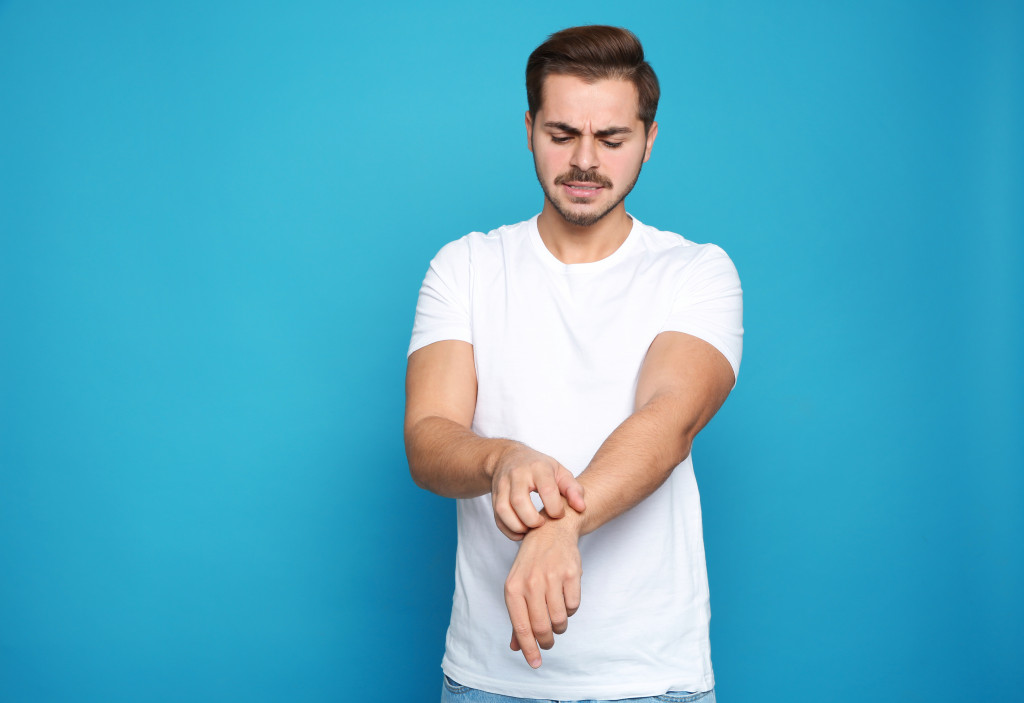Atopic eczema, also known as atopic dermatitis, is a chronic inflammatory skin condition that results in itchy, red skin. While there is no cure for atopic eczema, there are treatments that can help to control the symptoms. This article will explore the causes of atopic eczema, its symptoms, and some treatment options.
Causes of Atopic Eczema
As we mentioned before, the exact cause of atopic eczema is unknown. However, several risk factors have been associated with the development of atopic eczema. These include:
- Personal or family history of allergies – People with atopic eczema are likelier to have other allergic conditions such as asthma or hay fever. Likewise, if you have a family member with atopic eczema, you are more likely to develop the condition yourself.
- Residence in a cold climate – Atopic eczema is more common in countries with cold climates, such as the United Kingdom, Ireland, and Canada. It is thought that the dry air in these climates contributes to the development of atopic eczema.
- Immune system dysfunction – People with atopic eczema have been found to have a defect in their skin barrier function, which allows irritants and allergens to enter the body and trigger an immune response. This immune response leads to inflammation and the characteristic symptoms of atopic eczema.
- Stress – Stress has been found to worsen the symptoms of atopic eczema. While stress does not cause atopic eczema, it can worsen the condition.
- Skin irritants – Certain substances such as soaps, detergents, and fragrance can irritate the skin and trigger an episode of atopic eczema.
- Environmental factors – Exposure to dust mites, animal dander, or certain foods can trigger an outbreak of atopic eczema.
Symptoms of Atopic Eczema
Atopic eczema typically causes the skin to become itchy, dry, and cracked. The affected areas are typically on the face, hands, feet, inside the elbows, or behind the knees. The rash may be mild or severe. It may appear as patches of dry skin or as fluid-filled bumps that leak when scratched. The rash may also get infected if it is scratched too much.
Treatment Options for Atopic Eczema

There is no cure for atopic eczema, however, there are treatments that can help alleviate symptoms and improve quality of life. The good news is that many facilities offer treatment options for patients with atopic eczema. Often, they also can also provide food allergies treatment and education about several kinds of allergies. Some common treatments for atopic eczema include:
Topical corticosteroids
These medications reduce inflammation, ease itching, and reduce redness in affected areas. Topical corticosteroids come in various forms, including creams, ointments, and lotions. They can be applied directly to the skin 1-2 times per day for up to 2 weeks. However, it’s important to note that prolonged or excessive use of topical corticosteroids can cause side effects such as thinning of the skin and stretch marks.
Oral corticosteroids
Oral corticosteroids decrease inflammation in the body, thereby reducing the redness, swelling, and itchiness associated with atopic eczema flares. However, long-term use of oral corticosteroids can have potential side effects, such as weight gain and immune system suppression. As such, they should only be used under the guidance and supervision of a healthcare practitioner.
Antihistamines
Antihistamines work by blocking the histamine response in the body, reducing inflammation and itchiness associated with eczema flare-ups. Antihistamines may come in the form of a pill or topical ointment, and can be used on their own or in combination with other eczema treatments. It’s important to note that while antihistamines can provide relief from symptoms, they do not address the underlying causes of atopic eczema and should be used as part of a comprehensive treatment plan developed with a healthcare professional.
Phototherapy
When it comes to treating atopic eczema, phototherapy can be a highly effective option. Also referred to as light therapy, this treatment involves exposing the affected areas of skin to specific types of light in controlled settings. Phototherapy can help improve symptoms by reducing inflammation and decreasing the overactivity of the immune system that often underlies eczema flare-ups. The form of light used in phototherapy can vary, but one common option is narrowband ultraviolet B (UVB) light. This type of UV light helps stimulate vitamin D production in the skin, which can assist with healing and alleviating symptoms.
The bottom line
If you or someone you know is dealing with atopic eczema, know that you are not alone. According to the National Eczema Association, “Eczema affects 20% of American children (15 million) and 7% of American adults (18 million).” While there is no cure for atopic eczema, there are treatments that can help manage the symptoms. If you suspect you may have atopic eczema, be sure to consult a medical professional for an accurate diagnosis and treatment plan.

